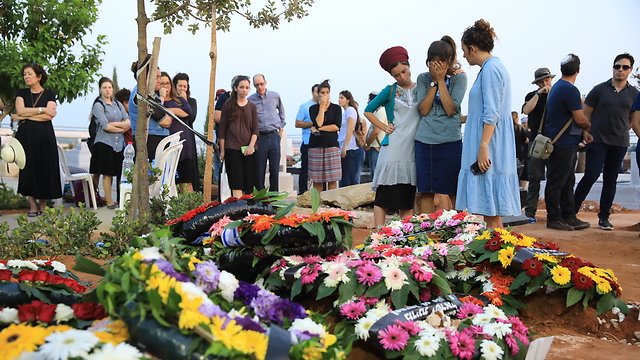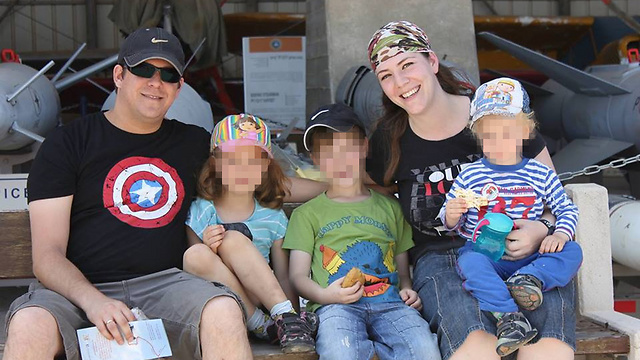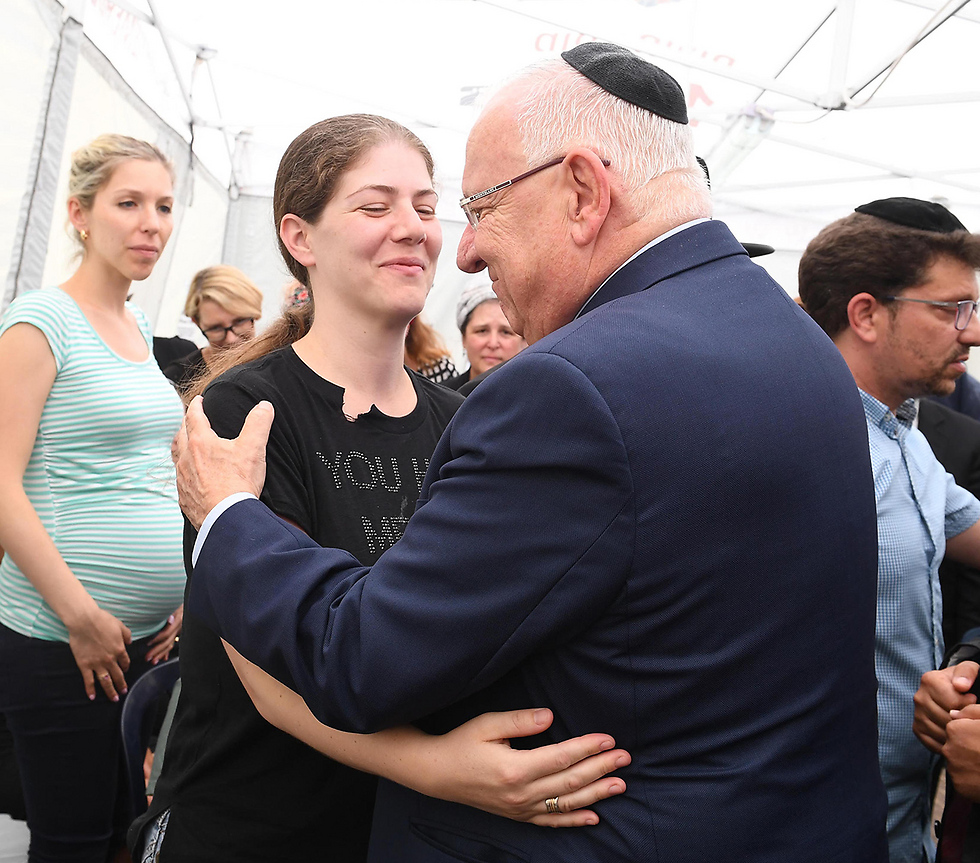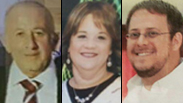

Surviving Salomon son recounts: ‘They killed everyone, my sister said, everyone’
In a single week, the Salomon family got tossed from pure happiness to a complete nightmare, from the joy over the birth of a new grandson to a horrible massacre around the Shabbat table. As they celebrate the newborn’s circumcision while mourning their three loved ones who were murdered in Halamish, the family members recall that terrible Friday night and explain why they've decided to choose life.
“We gave birth in the afternoon. I mean, Chen, my brave wife, gave birth. Since then, I’ve been walking on air. We waited for this baby for three years,” Shmuel Salomon told me last Wednesday, near the mourners’ tent in Elad. Since the birth, his world turned upside down, but he is clinging to life.
Shmuel, who is mourning his father, his sister and his brother, has a thread of life on his wrist—the baby wristband from the hospital, which he hasn’t taken off although the mother and the baby have already been discharged. Last Thursday, in an emotional circumcision ceremony held in Elad, the baby boy was given the name Ari Yosef, after his grandfather who was murdered in a terror attack.
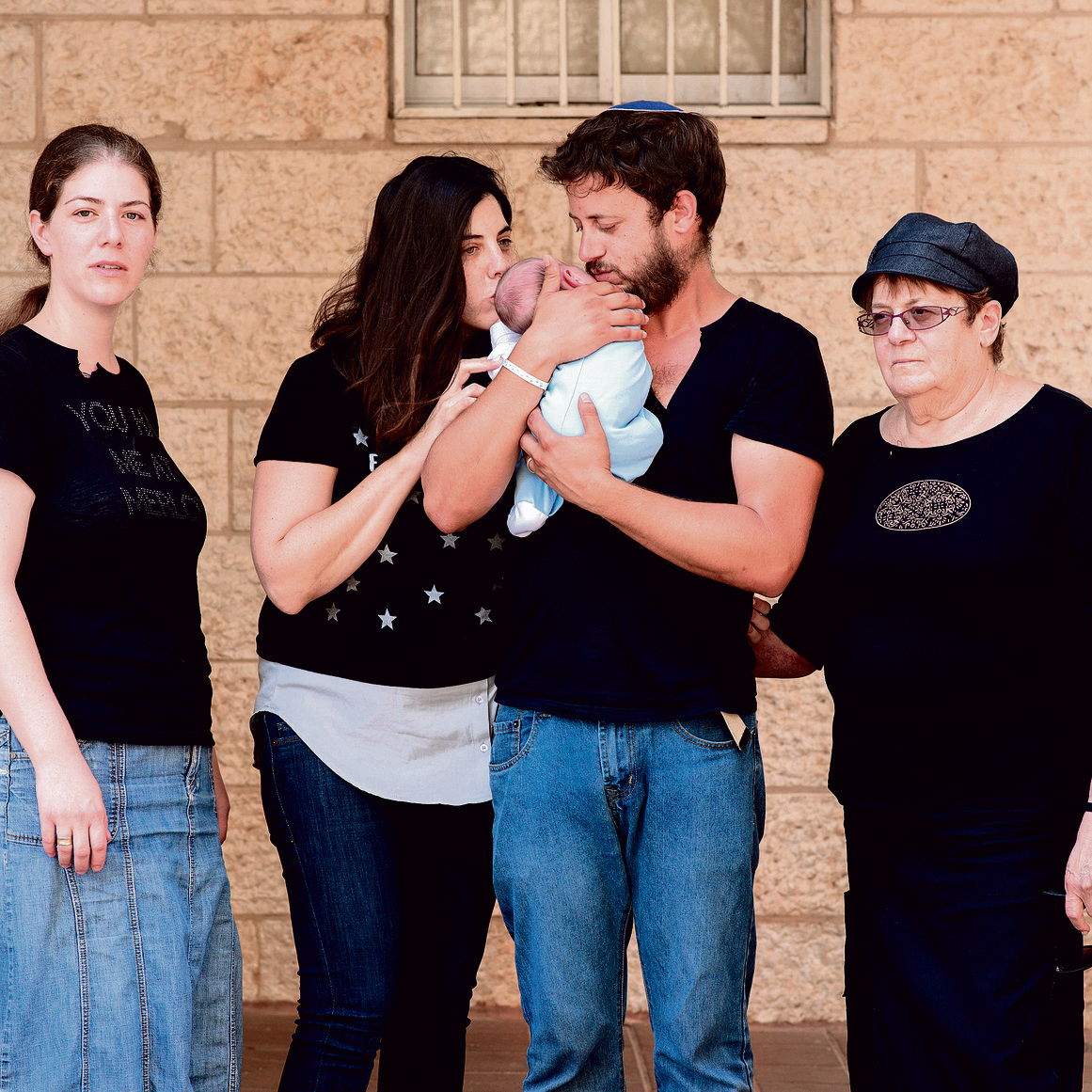
Tova and Yossi Salomon, the proud grandparents, danced with joy upon learning their youngest child had become a father. On Friday morning, Shmuel arrived at his childhood home in Neve Tzuf, the second name of the community of Halamish, to pick up Tova and run some errands.
“I was so happy when I got to my parents’ home,” he recalls. “They were very excited too. My mother came to help me prepare our house after the birth. We stopped at the Meir Medical Center to visit my wife and the baby.”
From the hospital, the proud grandmother and her son travelled to the young Salomon family’s home at the Hadassim Youth Village, where Chen works as an instructor.
“We organized the house, and then I drove Mother back to Neve Tzuf. I got held up in the house because my mother made sandwiches for me and some to take to Chen too. In between, I took her to the Fogel family. Mother went there to pick up the ‘arbis’ (chickpeas) that Tzila Fogel prepared for the ‘Shalom Zachar’ (a feast hosted by the family when a child is born).”
While Tova was at the Fogels’ home—the parents of Udi, who was murdered six years ago in Itamar with his wife and three of their children—Shmuel waited in the car. “It’s impossible to forget the Fogel case. I remember thinking about them, about how they have been coping since that horrible terror attack. It didn’t cross my mind for a minute that I would be dealing with a similar story within several hours," he says.
"A few minutes later, my mother returned to the car with the ‘arbis’ and a gift from Tzila—socks for the baby. Meanwhile, Michal, Elad and the kids arrived on the fortified bus. We only had time for a quick hello. My sister Haya was in the house too. I said goodbye to everyone in the most ordinary way. At least I managed to hug my father. Elad, Haya and my father never got to see the baby,” he says with his voice breaking as he hides the tears behind sunglasses.
He has kept quiet until now, angrily avoiding journalists, failing to come to terms with the fact he lost not only his father and two of his siblings in an instant, but also peace and anonymity.
“I realized I was no longer a private person. At first, it was very difficult for me, but that’s the way it is. I can’t believe we’re doing something like this, but we decided to invite the entire public to the brit (circumcision ceremony),” he explains why he decided to break his silence.
“After everyone came to cry with us, everyone should rejoice with us too. I want them to remember us happy. I want them to remember the Salomon family celebrating happy occasions, not being sad. I don’t want them to feel sorry for us. The Salomon family is a simple family, not a family of drama. What do terror attacks have to do with us? The only drama in the Salomon family until now was the nonsense I did in high school. In high school, I also stopped observing mitzvot. Today I am a ‘datlash’ (a formerly religious person).”
After leaving Neve Tzuf on Friday afternoon, Shmuel drove back to the Meir Medical Center to meet his wife and their firstborn. A few minutes before 10pm, a terrorist who managed to jump over the settlement's security fence entered the Salomon family’s home.
“He ran straight into the kitchen, where everyone was gathered to prepare the ‘Shalom Zachar,’” says 35-year-old Michal Landa-Salomon, who lost her husband Elad in the attack. “I was in the kitchen myself half a minute earlier. If (the terrorist) had looked straight ahead, he would have seen me and the kids. We were sitting in the living room opposite the entrance, but he ran into the kitchen. I saw his profile. I signaled for the children to come with me, and we passed two meters behind his back. Elad saw us, but the terrorist missed us. I went upstairs, and we shut ourselves in the room where the twins were sleeping. In spite of the screams, I signaled for the children to be quiet, and I leaned against the door with all my might.”
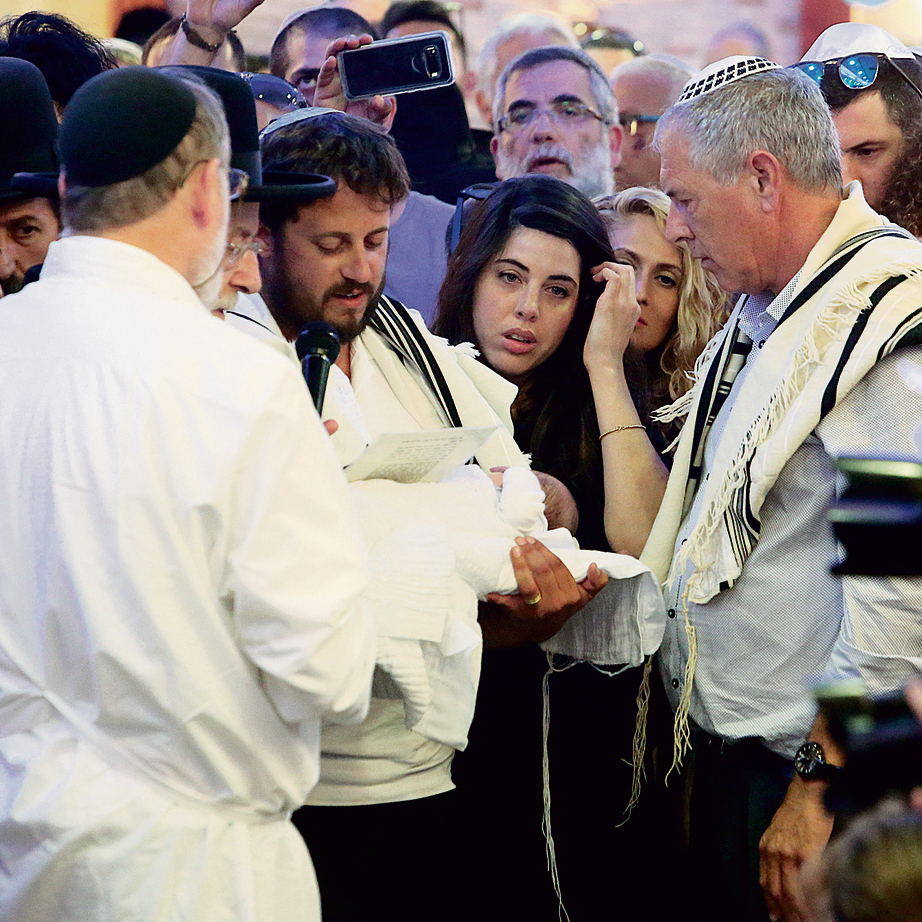
The first person the terrorist stabbed was 46-year-old Haya, who was near the entrance. With the little strength she had left, she walked out of the house, and her screams reached the neighbors. Then the terrorists stabbed Tova, the mother. “He suddenly pulled out a knife, so I bent down and he stabbed me in the back,” Tova said after being discharged from the hospital. “I escaped upstairs. At first, I locked myself up in a room, but then I thought they wouldn’t find me and I was losing blood, so I came out.”
Michal left the room for a moment with the children to get her cellphone, which was in another room, and encountered the wounded Haya for a second. In the meantime, the terrorist had stabbed 70-year-old Yossi and began struggling with Elad.
“Elad is a gentle person, but we understood from the investigation and from what my mother-in-law saw that he fought like a lion. He managed to knock the terrorist down twice. He delayed the terrorist and saved us. I keep thinking the outcome could have been much worse, and thanks to Haya who went outside and screamed and thanks to Elad, the children were saved,” Michal says with a smile filled with pain.
At the same time, Shmuel and Chen were at the hospital, caring for their baby together, filled with pride and joy. “We were in the room with the baby, totally focused on him. We were completely disconnected from our cellphones. I had already planned to go home, but then it turned out Chen needed a blood transfusion, and I stayed with her two more hours.
“In the middle of the transfusion, the phone rang and I saw my brother-in-law Dror’s number. Why is my brother-in-law calling on Shabbat? He told me there had been a terror attack in Neve Tzuf, and asked if I had heard anything. I hadn’t heard a thing. Several minutes later, my sister Orit called. She said it had happened in our house.
“In the meantime, my brother-in-law managed to get hold of Michal. It was a few minutes after the attack. She was still in the house. She told him on the phone the kids were okay, but added she had seen Elad take his three last breaths and that she thought she was a widow. She told him all of this in English, so the children who were next to her wouldn’t understand. She’s a lioness, that woman. A heroine.
“Meanwhile, there was a news update that there were people in critical condition. I’ve never heard of a person who survived a critical injury. They say critical injuries because the person hasn’t been proclaimed dead yet. Orit, my sister, called me again, crying. They killed everyone, she said, everyone.”
The medical staff at the Meir Hospital sprung into action. They managed to get hold of the Shaare Zedek Medical Center in Jerusalem and inquire about the people wounded in the attack. “A doctor informed me that Tova Salomon was alive, that she had arrived at the hospital and was in stable condition. I felt my mother had returned to me,” he chokes. “It took a while before a social worker arrived and officially informed me. It’s surreal. I already know what happened, but I’m hoping maybe it’s a mistake. I saw the house in the pictures, but it took me time to come to terms with the situation, if I ever did.”
‘The image is stuck in my head’
There’s one thing Shmuel is still unable to deal with—the image of the bloodbath in the kitchen. “I didn’t want to see the picture. I regret that moment. It’s the kitchen I grew up in from the day I was born. My entire childhood was in that house. It destroyed me. Whoever released the photo knew it would destroy my life. The image is stuck in my head. I haven’t been able to sleep since then.”
Shmuel is unable to shake the feelings of guilt over the fact he wasn’t there to fight the terrorist alongside his brother Elad. “How was I not there? To help him, to lend a hand, to fight, and even to die with Elad. I know Elad fought, and I’m not sure it would have ended differently if I were there, but I have an unclear conscience for not being there to protect my father, my sister Haya, to protect Elad.
“I had a wonderful childhood in Neve Tzuf. It’s an amazing place to grow up in, but at times of terror attacks, as a child, I used to think about what would happen if someone entered (our) house. I always had this kind of scenario in my head of what I would do. Since my military service, I always carry my weapon with me. I’m always ready, and at the moment of truth I wasn’t there.”
One person who was there was A., the neighbors’ son. A narrow path separates between the Salomon home and the home of A.’s family. Upon hearing Haya scream, A. and his father went outside. The father spotted the wounded Haya, entered the house and saw the terrorist’s back. He went back outside and informed his son. The son, an IDF soldier in an elite unit, ran home, grabbed his weapon, jumped over the fence under the kitchen window and neutralized the terrorist with one accurate shot.
During the shiva, the seven days of mourning, A. and his family visited the mourners’ tent and were greeted there with tears and hugs. The IDF, it was reported last week, is considering honoring A. with a Chief of Staff citation for attacking and neutralizing the terrorist.
“I’m grateful to A. for what he did,” Shmuel says. “He prevented a greater disaster. At first, when I heard the terrorist was still alive, it destroyed me. After all, he’ll be released in the next (prisoner exchange) deal. Then I realized A. did the right thing. He was afraid of hurting other people, so he neutralized him with one accurate bullet. When you come into such a scene, the most natural emotion is revenge. I don’t know where A. found the strength to leave the t… alive. I don’t even know what to call that creature.”
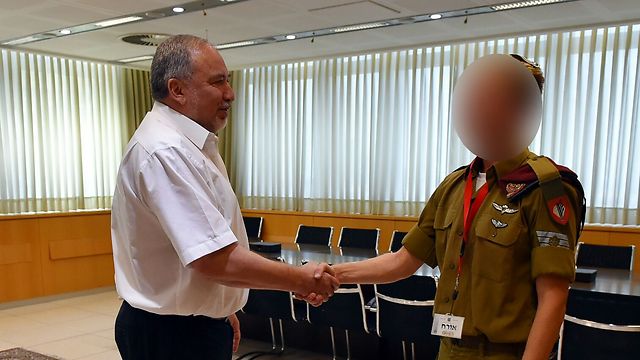
Shmuel stops the conversation. Chen arrives at the shiva with a green stroller carrying the new treasure. Her green eyes shine with joy too. Shmuel greets her with a smile. Six days after giving birth, Chen is already back on her feet, running between her parents’ home and the mourners’ tent. Life on one side, death on the other. They stand there together, Shmuel and Chen, holding each other, trying to contain the happiness without falling into a pit of sadness.
“I don’t feel like my joy from the baby has been damaged. Quite the opposite, perhaps. It has only increased the happiness from the child. I keep thinking about the baby and about Chen. I always thought if someone hurt my family, I would have no reason to keep living and would seek revenge. But Chen and the baby keep me alive. I don’t know what I would do if they weren’t with me. Chen strengthens me and keeps sending me pictures of the baby. I sit in front of consolers and look at the pictures. I have a reason to live.”
“I give him strength because everyone gives me strength,” Chen says. “Everyone is running around me. The parents, the family, the friends. They have all offered to help. It’s heartwarming. It’s very important to me that the brit will be happy. There’s grief here, that’s true, but there’s happiness here. There’s a child here who we’re happy about. We’ve decided to choose life.”
“We’ve decided to choose life, but we can also say life has chosen us,” Shmuel adds. “The fact we received the news at the maternity ward is life choosing us. On the other hand, how can a person receive such news in such a situation? When you have such a treasure in your hands? The first thing that crossed my mind was what kind of world did we bring him into. It’s simply inconceivable. But we won’t be defeated. We’ll keep going.”
The seven bad years
Ruthie, Michal’s eldest sister, joins the couple. She’s trying to arrange mementos to hand out at the brit, in the form of a keyring. She shows Shmuel and Chen different samples. Shmuel chooses a soft plant reflecting growth. Chen wants the memento to be colorful and joyful. She has a hard time accepting the caption “when thou wast in thy blood, Live.” The verse, which is said in every brit, takes on a particularly painful interpretation this time.Ruthie knows very well how to deal with death and loss. Her son, Shai, died of cancer six years ago, before turning five. “The Landa family is going through the seven bad years. They will be followed by the seven good years,” she says with a smile. The smile on her face is remarkably similar to the smile of the new widow, Michal. A glowing yet realistic, cynical smile.
On Saturday, after the disaster, Michal chose to go and stay with her children at Ruthie’s house in the settlement of Oranit. Ruthie’s son is not the only one who has passed away during the seven bad years. So have the grandfather, the uncle and the mother of the family, Ziva.
“We’re used to cancer, so where did a terror attack come from? That’s really creative,” Michal chuckles sardonically.
How do you manage to smile at everyone all the time?
“I let myself cry too. But I keep reminding myself the outcome could have been much worse. Besides, how can you not smile when talking about Elad?”
How did you meet?
“We met in Neve Tzuf and we were separated in Neve Tzuf. It was 12 years ago. I was 22 years old. I was staying at a friend’s house on Shabbat, and Elad came to visit. On Saturday evening, my friend and I and Elad and a friend of his decided to take a two-day trip to the north. Four months later, we got engaged. In the first year we lived in Neve Tzuf, until the first stone was thrown, and then I was afraid and we left.
“I was immediately enchanted by Elad. Elad was a very quiet guy at the time. His friends in the yeshiva in Nehalim called him ‘quiet Elad.’ But as much as he was quiet, he was goodhearted. Always caring for others and showering them with goodness. Over the years, he opened up because of me.
“We built a home for five children together. Elad worked as a computer software inspector and I worked in a nursing company. At home, we did everything together. Every Friday, we would go out to eat together, and then we would clean and cook together. Elad was excited and happy about each child. In many ways, he was a child himself. When our eldest son was still a baby, we went to buy Lego with so much enthusiasm. The saleswoman asked me if it was for the baby. I pointed at Elad and said to her, ‘It’s for him.’ He would open every new toy before anyone else. On the other hand, he was also an authoritative father who knew how to set limits. A special combination. He was particularly excited by the birth of our twins.
“Elad always had a smile on his face. Even when we went through difficult things. My mother, who was my inspiration, died of cancer two months before the twins were born. I always felt I had Elad’s support, and that with his optimism we would get through anything together.”
What have you told the children?
“I told them we would go on together, that we had each other. And I told them that they had a brave father who fought with all his might to save us.”
There seems to be no way to contain this inconceivable situation of celebrating a baby’s birth on the same week a family buries three of its loved ones after they were massacred around the Shabbat table. But the family members who survived insist on remembering the good, rather than letting death and terror defeat the Salomon heritage.
“What really makes the three of them unique is their dedication,” says Racheli, the fourth Salomon sister. “Yossi, my father, was an IDF civilian employee for many years, and after retiring he was in charge of organizing the community’s security. He was the life and soul of the Shabbat Kiddush. He would organize everything and hand out wine to everyone, although he himself couldn’t drink for medical reasons. He was always happy and always danced, a well-known figure in the community. In the past few years, he dedicated his life to Torah studies. He would travel to a Torah house of study in Jerusalem three times a week. He really loved it.”
“He had a beautiful connection with the grandchildren,” Michal adds. “He would always enlist the grandchildren. ‘Come sit next to me, come organize the synagogue with me.’ And Haya was dedicated too. She was a teacher in spirit.”
Haya, the eldest daughter who never married and didn’t get to raise children of her own, raised hundreds of students in a school in Lod, who were like daughters to her. “She was Haya the teacher who everyone loved,” says Michal. “She wouldn’t go to school with a small bag, but with a rucksack and a suitcase and a plastic bag, because she always had prizes and surprises to reward the girls with. And she would reward her nieces and nephews too, of course.”
“I can’t understand how anyone could hurt Haya,” Shmuel wonders. “That woman didn’t do anything bad to anyone. Such a gentle woman, who tried to do good things her entire life. After a day’s work, she would prepare pages and activities for the next day and talk to the girls’ parents for hours. Even when she shared with the parents things that weren’t so good about a student, it was always with love and concern.
“She was very dedicated to my parents too. She was basically my mother’s right-hand woman and her best friend. Every Monday, on Haya’s day off, they would run errands or pay visits together. How will my mother manage without her? How will we manage without Elad, without Father?”
“Salomon is a family of joy, giving and love. A home which accepts anyone,” Chen concludes. “They accepted me, the secular bride, with a lot of love. Every Shabbat, they would invite us to the Shabbat eve meal. ‘The most important thing is for you to come,’ they would tell us, ‘even if you drive on Shabbat.’ We loved coming there. We were there on Shabbat two weeks before the birth. We will pass this giving and this joy on to the next generation.”














